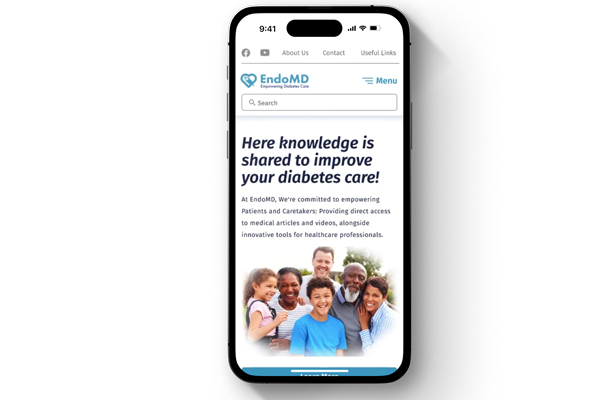A team of University of North Texas alumni and student researchers from the College of Visual Arts and Design and College of Information is attempting to help stem the progression of a health crisis that is impacting residents of rural Texas — diabetes.
Five UNT alumni and more than a dozen undergraduate and graduate students in communication design and data science collaborated with physicians to develop and test a new digital health technology system — EndoMD. The system facilitates online education and self-management support for diabetic patients and their caregivers in sparsely populated areas of Texas where the disease’s prevalence and complications are 15% to 20% higher than in urban areas.
“To do this effectively, you have to imagine what it’s like to live two-and-a-half hours from the nearest Walmart. That has really affected a lot of our thinking about this project,” says CVAD communication design professor Michael R. Gibson, who is co-leading the project with Flower Mound endocrinologist Dr. Wasim Haque.
Offering Design Expertise
Gibson, a patient of Haque, learned in 2022 that the doctor and his colleagues had begun work on a “web presence” they believed could help rural residents locate peer and community support, provide educational materials and combat misinformation about diabetes and its treatment.
 “The content they’d been developing was really strong, but they needed design help,”
says Gibson, who coordinates CVAD’s Interaction Design and Design Research graduate
programs. Recognizing a need for design expertise on the project, he suggested a collaboration
between UNT’s communication design students and Haque and his colleagues to develop
a comprehensive platform for EndoMD.
“The content they’d been developing was really strong, but they needed design help,”
says Gibson, who coordinates CVAD’s Interaction Design and Design Research graduate
programs. Recognizing a need for design expertise on the project, he suggested a collaboration
between UNT’s communication design students and Haque and his colleagues to develop
a comprehensive platform for EndoMD.
Scheduled to launch in Spring 2025, the platform will feature educational articles, graphics, images and short videos covering diabetes prevention, treatment, diet, caregiving and strategies for managing medical expenses.
“If we can tailor messages in ways that provide easy-to-understand information that reduces the intimidation factor for users, we think we can do a great amount of good,” Gibson says.
The project has received two rounds of funding totaling nearly $20,000 from CVAD’s Flagship Grants program, which seeds innovative research and creative activities by the college’s faculty.
“The EndoMD project contributes to the creation of replicable knowledge, advancing how collaborative teams from the design and health care fields can work together to address pressing issues while directly benefiting Texas communities,” says CVAD Dean Karen Hutzel.
Digital Health Research
Work on EndoMD began in early 2023. Gibson and CVAD assistant professor Cassini Nazir researched existing digital health technology systems and identified user-experience problems that had plagued similar efforts in other states — namely poor design and confusing user interaction issues.
The UNT research team spent nine months conducting interviews and focus group sessions with more than 60 volunteer participants ages 55 and older from rural areas of Texas. They tested existing digital health technology systems and EndoMD prototypes, then shared feedback on the systems’ usability.
The research highlighted the importance of a mobile-first design since up to 65% of rural Texans primarily use smartphones for internet access. However, the team encountered some unexpected challenges. A significant number of the participants were unfamiliar with website navigation elements such as “hamburger” menus. Also, many older users struggled with vision issues caused by a condition called diabetic retinopathy, necessitating larger text and other accessibility features throughout the platform.
Another discovery was the prevalence of misinformation about alternative diabetes treatments circulating on social media. The team realized the platform also would need to actively combat such disinformation to safeguard users’ health.
 Prior to graduating with a bachelor’s degree in communication design, Jonathan Tran
(’24) worked closely with focus group participants as a student researcher, developer
and project manager on the EndoMD team. Now working as a consultant on the project,
he leads its design efforts and hopes it “fosters interdisciplinary collaboration
within an academic space.”
Prior to graduating with a bachelor’s degree in communication design, Jonathan Tran
(’24) worked closely with focus group participants as a student researcher, developer
and project manager on the EndoMD team. Now working as a consultant on the project,
he leads its design efforts and hopes it “fosters interdisciplinary collaboration
within an academic space.”
Haque says the UNT team has had a “significant impact on the EndoMD project, helping with research that has guided the redesign of the platform as a trustworthy, online, interactive information resource. They also have obtained vital feedback so that it is appropriate to meet the needs of this target population.”
Once operational, the platform will collect limited user data to help determine future design decisions and enhance the system’s effectiveness. Due to the ongoing nature of its research, EndoMD will continually evolve based on user feedback.
In July 2025, Gibson plans to present the research team’s findings at the annual International Board of the Design User Experience and Usability Group of the Human Computer Interaction Organization conference in Gothenburg, Sweden. Haque also plans to publish articles about the project in medical journals.
Gibson says, “The EndoMD project has the potential to transform how diabetes self-management is facilitated for millions of rural Texans.”